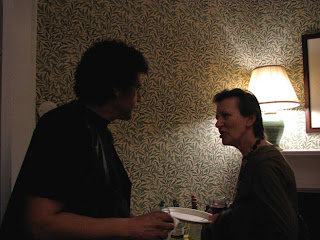The Clark Director, Michael Conforti (left) with Leo Steinberg before the lecture, April 23, 2008
(Photo: Chika Okeke-Agulu)
Two days ago at the Sterling and Francine Clark Art Institute, the venerable, brilliant and strikingly humorous artist, critic and art historian Leo Steinberg gave a lecture titled, "Oh Say Can You See," --which for those who have never gazed at the US flag, the Star Spangled Banner, with nationalistic fervor--are the first lines of the American national anthem. For a moment, on seeing the announcement for the lecture, I thought so what the heck does Steinberg have to say about America? Did he find reason to bring art and art history into the debate about nationalism (check the current ridiculous claim about Obama's antiAmericanism simply because he does not wear the US flag) in contemporary American art? Or What? Well, as it turned out, Steinberg spoke about the ways initial misreading (or mis-seeing) of visual facts on paintings breed generations insistent mis-interpretations. Is this a new trend in art criticism and art history? No, it started, he says, right from the very beginning of art history as we know it, that is from Giorgio Vasari himself! So, you can say that it is usual for people who claim to be specialists in interpreting art to NOT SEE the art they are interpreting, but instead to rely on the authority of someone else who could not claim to have positively answered the question "Oh say can you see...what's on the canvas?"
Steinberg (center) with guests at post-lecture reception in The Clark Fellows Residence
Clark Fellow, Kobena Mercer (left) and Zirka Filipczak, Chair of Williams College Art Department
(Photo: Chika Okeke-Agulu)
Clark Fellow, Aruna D'Souza and The Clark Resarch and Academic Program Director, Michael Ann Holly
(Photo: Chika Okeke-Agulu)

Williams College Museum of Art Director, Lisa Corrin (left), chatting with Conforti and a guest
(Photo: Chika Okeke-Agulu)
One of my favorite sequences in his case studies (which included Rauschenberg's Bed, Max Ernst's The Virgin Chastising the Christ Child before Three Witnesses, and two of Michelangelo's canonical works, Creation of Adam, and Last Judgment) is when he suggested that centuries-long interpretation of The Last Judgment as a visual epic of Apocalyptic damnation was based not so much on the free-thinking period of the 1530s (when the work was created) and Michelangelo's references to complex medieval sources as on later ecclesiastical orthodoxy. So, looking at Saint Sebastian(?)--seen in the painting clutching several arrows and no bow with a rather benign countenance, but which generations of scholars say is menacing the damned souls beneath him-- he says, is like looking at John Wayne playing with a few spent bullets, without any gun! The angels at the top left corner who are supposedly carrying Christ's Cross--the burden of it!-- are, Steinberg says, actually playing with it. So, looking at the angels after the lecture they now seem like fawners, and inebriated bacchae. Or when he suggested that The Creation of Adam is a "romance of young love," given that even though Adam is limply reaching out to God the Father, his gaze, in other words his attention, is focused on Eve who longingly reciprocates; it as if they see God as--come to think of it--a meddling parent!
Anyway, Steinberg is my favorite art historian, and I know it because for once in a long time (please don't ask how long, because I am still figuring out how time works) I did not doze off listening to an art history lecture.









